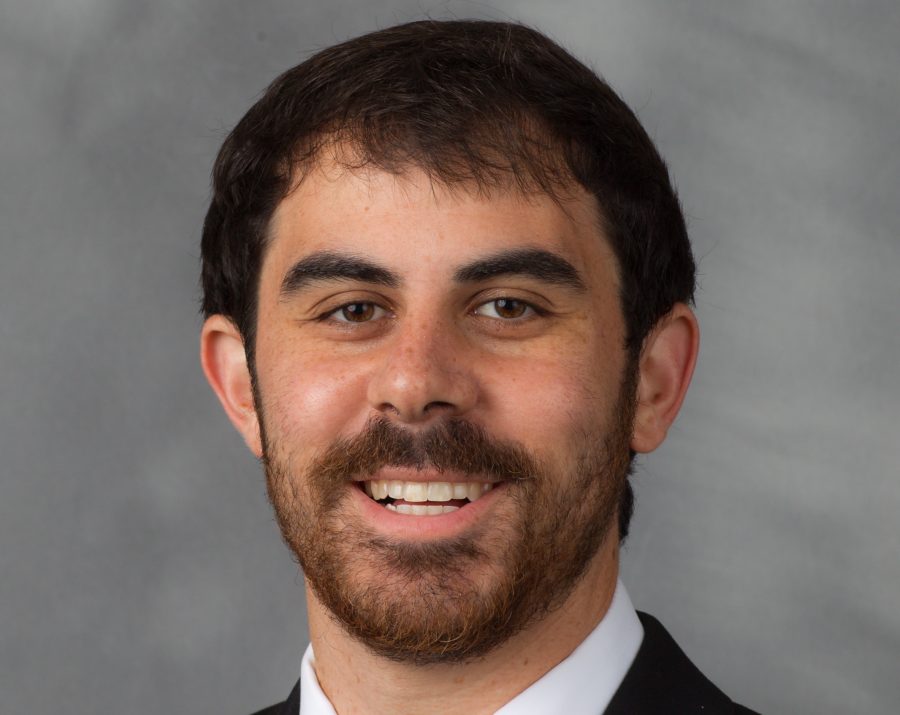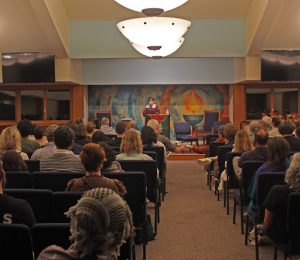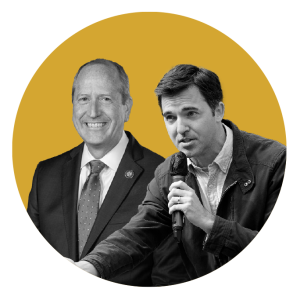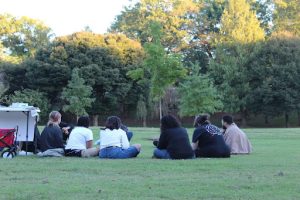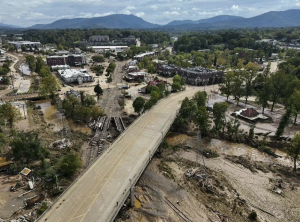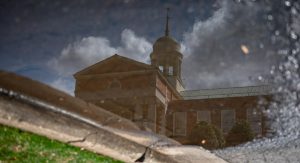Deacon Profile: Bradley Shugoll
Wake Forest Fellows program headshots, Thursday, August 8, 2013. Brad Shugoll (’13).
October 1, 2020
Brad Shugoll is the Associate Director of Service & Leadership in the Office of Civic & Community Engagement (OCCE). He first came to Wake Forest as an undergraduate in 2009 and returned to work full-time in 2016. He oversees civic leadership and service traditions such as Hit the Bricks, Project Pumpkin, Campus Kitchen and Wake’NShake. Over the summer, he created and directed the OCCE’s oral history project entitled Behind the Facemask, which details the effect of COVID-19 on the Winston-Salem community.
Could you give our readers a brief introduction about yourself including your role here at Wake Forest?
I grew up in Charlotte, N.C. and came to Wake Forest as a first-year student in 2009. I majored in Biophysics with a minor in Neuroscience. I was involved in intramural sports, serving as an RA and most significantly as a student leader with Campus Kitchen. Following graduation, I stayed at Wake Forest as the Fellow for the Division of Student Life [now Campus Life]. I went on to graduate school at the University of Michigan where I received my M.A. in Higher Education. In graduate school, I studied the connection between colleges and their communities and charted a professional path within civic engagement. After working at Elon University, I returned to Wake Forest to work full-time in July 2016.
How did you become interested in civic engagement?
As an undergraduate, I started volunteering through Campus Kitchen and found a deep sense of connection with the Winston- Salem community. I vividly remember a night in September when I joined the organization for the first time. From that point on, I served meals every Thursday at the Children’s Home. The sense of connection I built with those children over multiple years caused me to think differently about service. When I came into Wake Forest, I saw service as an extracurricular activity. As I was graduating, civic engagement had become a deep part of my identity and my understanding of what it meant to live in community. I developed an enduring sense of civic ethos that is resonant in our motto Pro Humanitate.
What is your favorite part about working for the OCCE?
The sense of community in our office. A few of the staff members were my mentors when I was a student and it has been great to work alongside them. We have a social and fun work environment and a focus on working with students. As an advisor to multiple events and organizations, I am working with students every day and that keeps me energized. I love meeting people as first year students in SPARC or volunteers for Campus Kitchen and watching them grow into leadership positions.
What kinds of virtual projects has the OCCE created for Wake Forest students to engage with the Winston-Salem community?
Since the outbreak of COVID-19, OCCE adapted quickly to provide a wide range of programs. This summer, we offered over 11 different ways for students to get involved, including a virtual tutoring program, social justice education, full-time internships with non-profit organizations, summer camps for children, the summer research collaborative and oral history projects. We had hundreds of students continuing to think critically about and engage with the Winston-Salem community.
This fall, we hope to support a vibrant sense of campus community and a connection to the larger purpose behind these events. This includes very large events like Hit the Bricks as well as in the virtual tutoring and debate watch party events that other members of my office organize.
What is the COVID-19 oral history project? What subjects were covered and what was the goal?
Since the outbreak of COVID-19, we have had an understanding of the historic relevance of this moment. We started the oral history project this summer as a way to collect community voices. The goal is to better understand and preserve the stories of this time. Student teams looked at healthcare, local businesses and the racial justice movement through the lens of COVID-19.
The student team and I worked in partnership with MUSE (Museum of Understanding Storytelling and Engagement) and the ZSR Library. This includes interview teams as well as a student archive and podcast team. The group collected over 40 interviews this summer.
Of note, when the project started in May the group did not anticipate covering racial justice activism. Following the death of George Floyd, the group made a decision to pivot to cover the evolving racial justice movement and protests. In Winston-Salem, this meant tracking the development of the Occupy Winston-Salem movement around the death of John Neville.
What does the future hold for the Oral History Project? Where will the podcast be available?
We’re excited to share out the first five episodes of the podcast, which are available on our website and on Spotify. We also have an archival site that shares out all the full-length interviews from the summer that will be available in October.
This fall, the oral history project will continue on. We have a strong group of returning students as well as a few new faces. In addition to the themes from the summer, students will explore stories related to the 100th anniversary of the 19th Amendment and the ways that COVID-19 is affecting the current election.
Hit the Bricks is happening as we speak, could you explain how the historic event has been adapted to fit COVID-19 regulations?
This year the event will move to a week-long engagement. It will include both virtual and socially distanced events. We will still focus on running and fundraising and Hit the Bricks will be both a participatory event and a team competition. We will have a version of our time trial, Sprint the Bricks, as well as the closing ceremony. We are also adding in new events such as the Find the Brick scavenger hunt and the nightly Quiz the Bricks virtual event. We have already seen very strong interest on campus as well as the largest involvement ever from our alumni community.
Why do you think engaging with the Winston-Salem community is such an important thing for Wake Forest students to do?
Community involvement both on and off campus is a vital component of the college experience. There are many ways to get to know the community you live in and I have found none more valuable than civic engagement. I would encourage students to find an opportunity to get involved with a non-profit and sustain that commitment over multiple years. What you learn outside of the classroom will shape the person you become. By taking that step to get involved, you’ll learn more about your community and also yourself than you could imagine.
Editor’s note: This interview has been edited and condensed for clarity and AP style.


